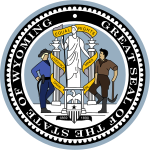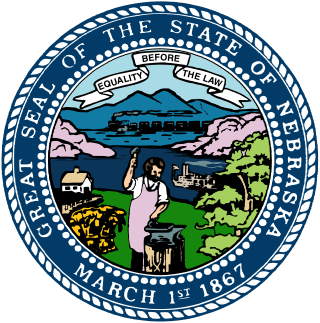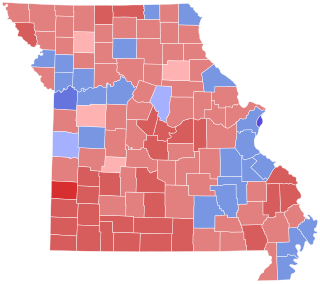| |||||||||||||||||
| |||||||||||||||||
 County results Thomas: 60–70% 70–80% 80–90% | |||||||||||||||||
| |||||||||||||||||
| Elections in Wyoming |
|---|
 |
The 2000 United States Senate election in Wyoming was held on November 7, 2000. Incumbent Republican U.S. Senator Craig Thomas won re-election to a second term.
| |||||||||||||||||
| |||||||||||||||||
 County results Thomas: 60–70% 70–80% 80–90% | |||||||||||||||||
| |||||||||||||||||
| Elections in Wyoming |
|---|
 |
The 2000 United States Senate election in Wyoming was held on November 7, 2000. Incumbent Republican U.S. Senator Craig Thomas won re-election to a second term.
| Party | Candidate | Votes | % | |
|---|---|---|---|---|
| Democratic | Mel Logan | 16,530 | 64.59% | |
| Democratic | Sheldon Sumey | 9,062 | 35.41% | |
| Total votes | 29,612 | 100.00% | ||
| Party | Candidate | Votes | % | |
|---|---|---|---|---|
| Republican | Craig Thomas (Incumbent) | 68,132 | 100.00% | |
| Total votes | 68,132 | 100.00% | ||
| Party | Candidate | Votes | % | ±% | |
|---|---|---|---|---|---|
| Republican | Craig Thomas (Incumbent) | 157,622 | 73.77% | +14.90% | |
| Democratic | Mel Logan | 47,087 | 22.04% | −17.27% | |
| Libertarian | Margaret Dawson | 8,950 | 4.19% | +2.37% | |
| Majority | 110,535 | 51.73% | +32.17% | ||
| Turnout | 213,659 | ||||
| Republican hold | Swing | ||||

Jean Anne Carnahan was an American politician and writer who was the First Lady of Missouri from 1993 to 2000, and served as the state's junior United States senator from 2001 to 2002. A Democrat, she was appointed to fill the Senate seat of her husband Mel Carnahan, who had been posthumously elected after his death in October, becoming the first woman to represent Missouri in the U.S. Senate.

The 2002 United States Senate elections featured a series of fiercely contested elections that resulted in a victory for the Republican Party, which gained two seats and thus a narrow majority from the Democratic Party in the United States Senate. The Senate seats up for election, known as class 2 Senate seats, were last up for regular election in 1996. The election cycle was held on November 5, 2002, almost 14 months after the September 11, 2001, attacks.

The 2000 United States Senate elections were held on November 7, 2000. The elections coincided with other federal and state elections, including the presidential election which was won by Republican George W. Bush. These elections took place 6 years after Republicans had won a net gain of eight seats in Senate Class 1. Despite George W. Bush's victory in the presidential election, the Republicans lost four senate seats, the most a winning president's party has lost since the passage of the 17th Amendment. This election marked the first election year since 1990 where Democrats made net gains in the Senate. Democrats defeated incumbent Republicans in Delaware, Michigan, Minnesota, Missouri, and Washington, and they won an open Republican-held seat in Florida. In Missouri, the winner was elected posthumously. The Republicans defeated Democratic incumbent Chuck Robb in Virginia, and won an open seat in Nevada. Additionally, Republican Senator Paul Coverdell of Georgia died earlier in the year and was replaced by Democratic appointee Zell Miller, who then went on to win the special election.

The 2008 United States Senate elections were held on November 4, 2008, with 35 of the 100 seats in the Senate being contested. 33 seats were up for regular elections; the winners were eligible to serve 6-year terms from January 3, 2009, to January 3, 2015, as members of Class 2. There were also 2 special elections, the winners of those seats would finish the terms that ended on January 3, 2013. The presidential election, which was won by Democrat Barack Obama, elections for all House of Representatives seats; elections for several gubernatorial elections; and many state and local elections occurred on the same date.

The 1954 United States Senate elections was a midterm election in the first term of Dwight D. Eisenhower's presidency. The 32 Senate seats of Class 2 were contested in regular elections, and six special elections were held to fill vacancies. Eisenhower's Republican party lost a net of two seats to the Democratic opposition. This small change was just enough to give Democrats control of the chamber with the help of the Independent who at the start of this Congress in January 1955 agreed to caucus with them; he later officially joined the party in April 1955.

The 2006 United States Senate election in Nebraska was held on November 7, 2006. Incumbent Democrat Ben Nelson won re-election to a second term, easily defeating Republican Pete Ricketts. Nelson won 63.9% of the vote to Ricketts's 36.1% Ricketts was later appointed in January 2023 to Nebraska's other Senate seat after serving as Governor of Nebraska from 2015 to 2023.

The 2006 United States Senate election in Wyoming was held November 7, 2006. The primaries were on August 22, 2006, in which both incumbent Republican Craig Thomas and his Democratic challenger were unopposed. Thomas won re-election to a third term, but died of leukemia on June 4, 2007; fellow Republican John Barrasso was subsequently appointed and has held the seat since.

The 2004 United States Senate election in Vermont was held on November 2, 2004. Incumbent Democratic U.S. Senator Patrick Leahy won reelection to a sixth term.

The 2002 United States Senate special election in Missouri was held on November 5, 2002, to decide who would serve the rest of Democrat Mel Carnahan's term, after he died while campaigning and posthumously won the 2000 election. The winner would serve the remainder of the term ending in 2007. Governor Roger Wilson appointed Carnahan's wife Jean, also a Democrat, to serve temporarily. She then decided to run to serve the remainder of the term, but she was narrowly defeated by Republican nominee Jim Talent.

The 2008 United States Senate special election in Wyoming took place on November 4, 2008, at the same time as the regular election to the United States Senate in Wyoming. The special election occurred to complete the term of Republican incumbent Craig L. Thomas, who won reelection in 2006, but died in June 2007. Despite being a Democrat, Governor Dave Freudenthal was obliged by state law to appoint a Republican, and selected state senator John Barrasso, who was unopposed in the Republican primary and won the general election to fill the remainder of the term ending January 3, 2013. This is the last time that both of Wyoming's U.S. Senate seats were concurrently up for election.

The 2014 United States Senate election in Wyoming took place on November 4, 2014, to elect a member of the United States Senate for the State of Wyoming. Incumbent Republican senator Mike Enzi won re-election to a fourth term in office. Enzi held Democratic nominee Charlie Hardy to just 17.4 percent of the vote – the lowest percentage of the vote for any major party nominee in Wyoming U.S. Senate electoral history out of the 39 races conducted during the direct election era.

The 1926 United States Senate election in Illinois took place on November 2, 1926.

The 2020 United States Senate election in Alaska was held on November 3, 2020, to elect a member of the United States Senate to represent the State of Alaska, concurrently with the nationwide presidential election, as well as other elections to the United States Senate, elections to the United States House of Representatives, and various state and local elections. Incumbent Republican Senator Dan Sullivan won re-election to a second term in office, defeating Democratic nominee Al Gross, the son of Avrum Gross, who ran as an independent candidate. John Wayne Howe, the nominee of the Alaskan Independence Party, was also on the ballot and finished a distant third.

The 2018 United States Senate election in Utah took place on November 6, 2018, to elect a member of the United States Senate to represent the State of Utah, concurrently with other elections to the United States Senate, elections to the United States House of Representatives, and various state and local elections. The primaries took place on June 26.

The 2018 United States Senate election in West Virginia took place on November 6, 2018, to elect a member of the United States Senate to represent the State of West Virginia, concurrently with other elections to the United States Senate, elections to the United States House of Representatives, and various state and local elections. This was one of ten Democratic-held Senate seats up for election in a state won by Donald Trump in the 2016 presidential election.

The 1926 United States Senate election in Oklahoma took place on November 2, 1926. Incumbent Republican Senator John W. Harreld ran for re-election to a second term. After facing many challengers in a crowded Republican primary, he advanced to the general election. In the Democratic primary, Congressman Elmer Thomas beat out a similarly crowded field, which included former Governor Jack C. Walton, to win his party's nomination with a plurality. In the general election, Thomas defeated Harreld in a landslide, winning his first of four terms in the U.S. Senate.

The 2022 United States Senate election in Indiana was held on November 8, 2022, to elect a member of the United States Senate to represent the state of Indiana. Incumbent Senator Todd Young won a second term.

The 2020 South Carolina State Senate elections took place as part of the biennial 2020 United States elections. South Carolina voters elected state senators in all 46 senate districts. State senators serve four-year terms in the South Carolina Senate, with all of the seats up for election each cycle. The primary elections on June 9, 2020, determined which candidates appeared on the November 3, 2020, general election ballot.

Beginning shortly after the city's incorporation as a city in 1846, elections have been held in the mayor of Manchester, New Hampshire. The following article provides information on the elections for mayor in the city during the 21st century.

The 2024 Kentucky Senate election was held on November 5, 2024. The Republican and Democratic primary elections were held on May 21. Half of the senate was up for election. Following the 2022 election, Republicans and Democrats held 31 and seven seats, respectively. The deadline for candidates to file was January 5, 2024. Republicans maintained their majority in the chamber without gaining or losing any seats.